| Revision as of 22:22, 16 January 2021 editMighty Antar (talk | contribs)Extended confirmed users5,165 edits Updated caption← Previous edit | Revision as of 04:17, 7 February 2021 edit undoGoodDay (talk | contribs)Autopatrolled, Extended confirmed users, Pending changes reviewers493,435 editsNo edit summaryNext edit → | ||
| Line 1: | Line 1: | ||
| {{short description|Misplaced Pages list article}} | {{short description|Misplaced Pages list article}} | ||
| ] | ] | ||
| This is a '''list of ]s by country of origin'''. This list excludes cars over 700 cc and cars where production or manufacture ended before 1945. | This is a '''list of ]s by country of origin'''. This list excludes cars over 700 cc and cars where production or manufacture ended before 1945. | ||
Revision as of 04:17, 7 February 2021
Misplaced Pages list article
This is a list of microcars by country of origin. This list excludes cars over 700 cc and cars where production or manufacture ended before 1945.
Microcars have been defined as "very compact, small-engined cars, designed for use in large cities, especially in Japan". even though in Japan such cars are known as kei cars. Microcars have also been defined as being a "small car, popular in the 1950s, that featured a body offering full weather protection and mechanics often derived from motorcycle technology", though in the 1950s, a trend towards egg-shaped cars with a relatively large ratio of windows to bodywork meant that the affectionate term bubble car was used.
The term microcar is usually applied only to such small cars built after World War II; cars built prior to the war are more generally referred to as cyclecars. However, one dictionary definition states simply that a microcar is "a small fuel-efficient automobile".
An attempt at a more specific definition for microcars suggested by some enthusiasts is "economy vehicles with either three or four wheels, powered by petrol engines of no more than 700 cc or battery electric propulsion, and manufactured since 1945".
In short, defining what is or what is not a microcar is not an exact science. Microcar is a subjective common noun, so no list will ever be definitive. But with museums devoted solely to microcars, numerous published encyclopedias of microcars and microcar enthusiast clubs worldwide, this list is an attempt to collate as many of these vehicles as possible into a common grouping.
List of microcars by country of origin
| This list is incomplete; you can help by adding missing items. (October 2019) |
Gallery
- Microcar gallery
-
 Aixam 400
Aixam 400
-
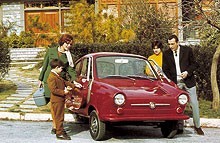 Alta A200
Alta A200
-
 Attica 200
Attica 200
-
 Attica DIM 652
Attica DIM 652
-
 Autobianchi Bianchina Trasformabile Special
Autobianchi Bianchina Trasformabile Special
-
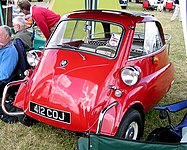 BMW Isetta 300
BMW Isetta 300
-
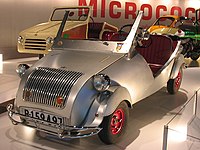 Biscúter 100
Biscúter 100
-
 Biscúter Comercial 200C
Biscúter Comercial 200C
-
 Bond Bug
Bond Bug
-
CityEl
-
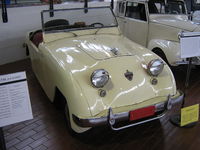 Crosley Super Sport
Crosley Super Sport
-
Daihatsu Mira 7th Generation
-
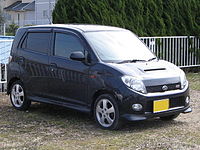 Daihatsu Fellow Max
Daihatsu Fellow Max
-
 Daihatsu Bee
Daihatsu Bee
-
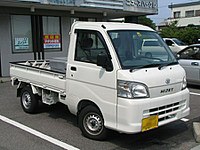 Daihatsu Hijet / Piaggio Porter
Daihatsu Hijet / Piaggio Porter
-
 David Torpedo 2 S
David Torpedo 2 S
-
 Fiat 126
Fiat 126
-
 Polski Fiat 126p
Polski Fiat 126p
-
 Fiat 500 Topolino
Fiat 500 Topolino
-
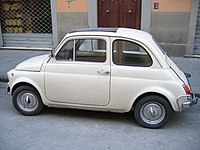 Fiat 500
Fiat 500
-
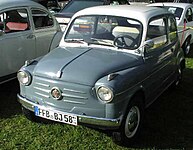 Fiat 600
Fiat 600
-
 Fiat 600 Multipla
Fiat 600 Multipla
-
 Fram King Fulda (1957)
Fram King Fulda (1957)
-
Goggomobil Dart
-
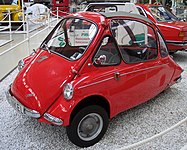 Heinkel Kabine
Heinkel Kabine
-
 Honda N Sedan
Honda N Sedan
-
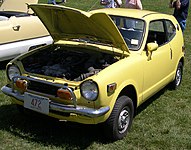 Honda Z Coupe
Honda Z Coupe
-
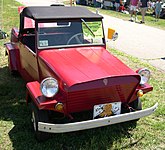 King Midget Model III
King Midget Model III
-
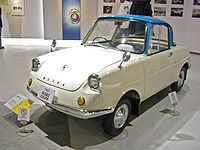 Mazda R360 coupe
Mazda R360 coupe
-
 Messerschmitt Kabinenroller
Messerschmitt Kabinenroller
-
 Mitsubishi Minica 1st Generation
Mitsubishi Minica 1st Generation
-
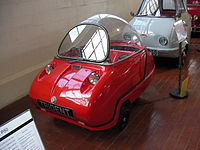 Peel Trident
Peel Trident
-
 Peel P50
Peel P50
-
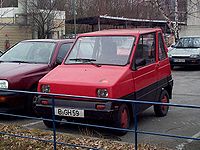 Puli
Puli
-
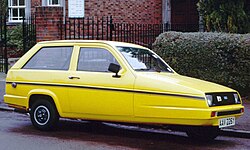 Reliant Rialto
Reliant Rialto
-
 Sebring Vanguard Citicar
Sebring Vanguard Citicar
-
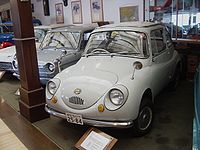 Subaru 360
Subaru 360
-
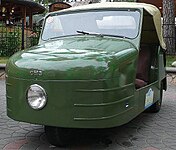 Soviet SMZ S-1L
Soviet SMZ S-1L
-
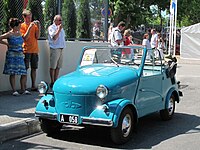 SMZ S-3A
SMZ S-3A
-
 SMZ S-3D
SMZ S-3D
-
ZAZ-965
See also
References
- Schwarz, Catherine, ed. (1994). The Chambers Dictionary. ISBN 0-550-10255-8.
- Rupert Livesey; Robin Sawers; Liz Greasby, eds. (1996). Dictionary of Automobile Engineering. Peter Collin Publishing. ISBN 0-948549-66-1.
- "65 MPH and 80 MPG-That's the Messerschmitt". Motorcycle Mechanics. London. April 1963. pp. 34–35.
- "Webster's New Millennium Dictionary of English" (Preview Edition (v 0.9.7)). Dictionary.com. 2007. Retrieved 2007-09-16.
- "About RUM". The Register of Unusual Microcars. 2007. Retrieved 2007-09-14.
- "The Bruce Weiner Microcar Museum". microcarmuseum.com. 2007. Retrieved 2007-09-30.
- "The Bubble Car Museum". bubblecarmuseum.co.uk. 2007. Retrieved 2007-09-30.
- Rees, Chris (1995). Microcar Mania. Bookmarque Publishing. ISBN 1-870519-18-3.
- Dan, Michael (2007). A–Z of Popular Scooters and Microcars. Bookmarque Publishing. ISBN 978-1-84584-088-4.